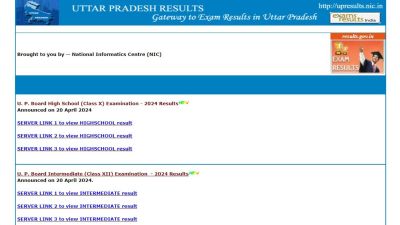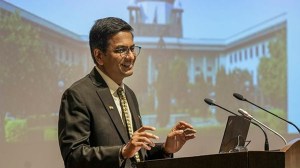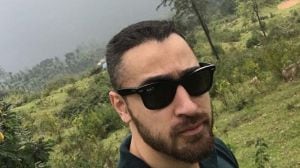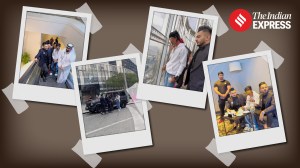- India
- International
Explained: Caste on US campuses
California State University, the largest 4-year public university system in the US, has added caste as a protected category against discrimination. The move has triggered a backlash from the Hindu Right in America.
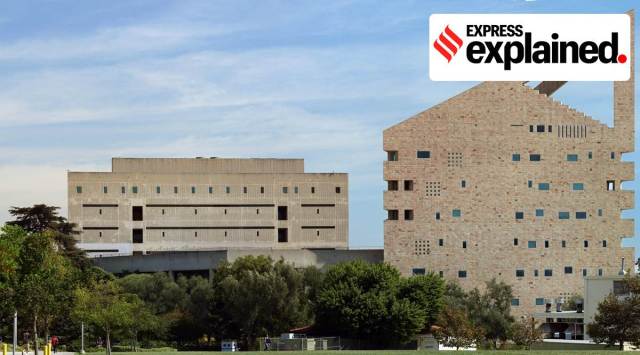 Cal Poly Pomona
Cal Poly PomonaOn several American campuses, a new battlefront is emerging: caste is making its way into anti-discrimination frameworks, and drawing Hindu rightwing backlash.
After California State University (CSU) announced last month that it had added caste as a protected category against discrimination, a section of the faculty protested, fearing it could be used to target teachers of Indian and South Asian descent.
CSU wasn’t the first American university to act against caste but its decision carries significant implications, given that it is the largest four-year public university system in the US, with 23 campuses, almost 5 lakh students, and 29,000 teachers.
Over the last two years, at least three other institutions — Colby College in Maine, Brandeis University in Massachusetts, and the Ivy League Harvard University — have adopted safeguards against caste discrimination.
Leading the pushback

An American Hindu Right advocacy has led the pushback against CSU. The Hindu American Foundation (HAF) wrote to CSU’s board of trustees last month opposing the decision.
HAF has said it was approached by “concerned faculty members” at CSU, and is helping teachers to mount a legal challenge against the university.
“We are helping concerned faculty explore all legal avenues to ensure their constitutionally guaranteed rights to equal protection and due process are protected,” a spokesperson for the foundation told The Indian Express.
The HAF says it is not affiliated to any religious or political organisation, but its co-founder Mihir Meghani has been actively involved with the Vishwa Hindu Parishad of America. HAF had opposed the State of California’s lawsuit against Cisco Systems Inc., which was a watershed moment in caste conversation in the US.
In 2020, the California Department of Fair Employment and Housing had sued Cisco and two of its employees for alleged discrimination against a Dalit engineer. HAF filed a motion to intervene in the case, arguing that the State of California’s assertion that caste is “a strict Hindu social and religious hierarchy” is an “inaccurate and unconstitutional definition” that would “perversely lead to increased targeting of and discrimination against Indian-origin, and particularly Hindu workers”.
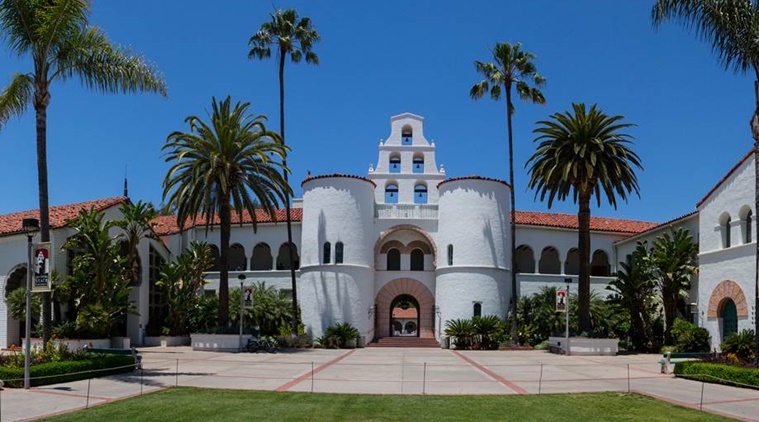 San Diego State University
San Diego State University
Criticism and defence
Two Indian-origin faculty members, Praveen Sinha and Sunil Kumar, have publicly criticised CSU’s decision as “misguided overreach”, since American laws already protect against different forms of discrimination.
“We cannot but oppose the unique risk that CSU’s move puts on us as they add a category that is only associated with people of Indian descent, such as myself and thousands of other faculty and students in the CSU system. It is going to create divisions where they simply do not exist,” Sinha, a professor of accountancy at CSU Long Beach, said in a statement released by HAF.
According to Kumar, who teaches engineering at San Diego State University, the policy was changed without referring to any scientifically reliable evidence or data.
“Rather than redressing discrimination, it will actually cause discrimination by unconstitutionally singling out and targeting Hindu faculty of Indian and South Asian descent as members of a suspect class because of deeply entrenched, false stereotypes about Indians, Hindus and caste,” he said in a statement that was put out by the HAF.
Neither Kumar nor Sinha responded to questions emailed by The Indian Express.
Vamsee Juluri, a professor of media studies at the University of San Francisco, said he was “disappointed” with the attitude of the American Hindu groups. “There has been too much unnecessary polarisation in the Indian/ Hindu/ South Asian community as a result of mixing up partisan political interests from India with the realities of life, struggle, and privilege in America,” he said.
Juluri said he did understand the concerns over the operationalisation of anti-caste policies, “especially given the tendency of some Silicon Valley diversity experts and other racists in America to refer to Indian immigrants as ‘parasites’ ”, and the existence of “a lot of anti-Indian and particularly anti-Hindu hatred and ignorance” in the US.
While that should be “confronted and checked”, however, “the lasting solution… is not to deny the victims of caste, but to more directly confront the sources of white supremacy and corporate power in securing appropriate protections”, he said.
“American society recognises anti-Semitism, Islamophobia, and a range of historic and structural wrongs. If Hindu American groups have failed to persuade a large part of the Indian American community, let alone the broader American society, that they deserve similar protections too for Indophobia/ Hinduphobia from racial and religious supremacists in America, the fault is at least partly their own. They should be… open to the possibility that both Hinduphobia and casteism can be opposed,” Juluri said.
Student-led push
At Colby College, the move to take on caste discrimination was led by teachers Sonja Thomas and David Strohl, who study caste in South Asian Muslim and Christian societies. The action at CSU by contrast, marked the culmination of a long process that was driven by students.
In October 2020, Prem Pariyar, 38, then a student at the Social Work department of CSU East Bay, complained of caste discrimination on campus. Pariyar, a Dalit from Nepal who had gone to the US in 2015 to claim asylum from caste atrocities, told The Indian Express:
“I found myself bullied by Nepali dominant caste students on campus…and realised the importance of caste protection at the department. I started a conversation with my professors on my experiences in Nepal, while working in the restaurant industry in the Bay Area, and in CSU.”
His professor Ruvani Fonseka connected him to Thenmozhi Soundararajan, Executive Director at Equality Labs, a Dalit civil rights organisation in the US. Pariyar gave his testimony at a faculty meeting, where Soundararajan did a presentation on caste discrimination in the US.
It was decided to add caste as a protected category at the department level, and the Academic Senate subsequently adopted it at the college level.
The resolution acted as a template in student groups across CSU campuses, and student governments on two other campuses, Cal Poly San Luis Obispo and Cal Poly Pomona, passed similar resolutions. Student leaders such as Manmit Singh, who was then at San Luis Obispo, worked to mobilise student networks to build a “multi-racial and multi-caste effort”.
In April 2021, four students including Manmit drafted a resolution that was passed by the California State Student Association (CSSA), a body with representatives from all 23 campuses, after a three-hour hearing. It was decided that CSSA would urge the Chancellor that caste be adopted as a ‘Protected Status’ category.
But there was pushback, too. “I saw when a student would speak about a Dalit issue, saying ‘this is what happened’ or ‘this is what I experienced’, immediately someone would come after that and say ‘no that doesn’t exist’, ‘that doesn’t happen’,” said Krystal Raynes, a student trustee on CSU’s board of trustees.
A meeting with the Chancellor’s office followed that summer, and in January 2022, the addition was made to the anti-discrimination policy.
Newsletter | Click to get the day’s best explainers in your inbox
More Explained
Must Read
EXPRESS OPINION
Apr 20: Latest News
- 01
- 02
- 03
- 04
- 05












